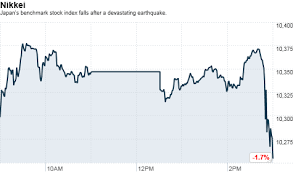
Headline indices of the Japan share market were down on Thursday, 28 February 2019, dragged down by disappointing economic data from China and after cautious comments from US Trade Representative Robert Lighthizer dented some of the recent optimism towards Sino-US trade relations. Rising India-Pakistan tensions also weighed on sentiment. Investors digested a raft of local economic data. Total 22 subsectors out of 33 subsectors of the Tokyo Stock Exchange declined, with shares in Marine Transportation, Electric Appliances, Machinery, Nonferrous Metals, and Iron & Steelissues being notable losers, whereas Fishery, Agriculture & Forestry, Mining, and Oil & Coal Products issues were notable gainers. Around late afternoon, the 225-issue Nikkei Stock Average declined 75.86 points, or 0.35%, at 21,480.65. The broader Topix index of all First Section issues on the Tokyo Stock Exchange lost 5.85 points, or 0.36%, at 1,614.57.
Market participants took a back foot after Factory activity in China shrank for the third straight month in February, as output activities contracted more quickly than the previous month due to the weeklong Lunar New Year holiday. China's official manufacturing gauge fell to a three-year low, highlighting deepening cracks in an economy facing persistently weak demand at home and abroad.
The China's official manufacturing purchasing managers index (PMI), which gives a snapshot of operating conditions in the manufacturing sector, dipped further to 49.2 in February from 49.5 in the previous month, according to data released Thursday by the National Bureau of Statistics (NBS). The reading marks its lowest since February 2016. A reading of 50 separates expansion from contraction.
Growth in China's services industry slowed in February after rebounding for two straight months, an official survey showed on Thursday. The official non-manufacturing Purchasing Managers' Index (PMI) fell to 54.3 in February from 54.7 in January, but still well above the 50-point mark that separates growth from contraction. The composite PMI, which covers both manufacturing and services activity, edged down to 52.4, from January's 53.2. The fast-growing services sector accounts for more than half of China's economy, and has helped buffer the impact of slowing manufacturing.
Sentiments was partly dampened as US Trade Representative Robert Lighthizer dialed back expectations for a sweeping trade deal with China, while traders attention switched to Michael Cohen, the president's former attorney, who said that President Donald Trump committed crimes while in office, in a hotly contested House hearing. Meanwhile, Federal Reserve Chair Jerome Powell told lawmakers that he'll soon announce a plan to stop shrinking the central bank's $4 trillion balance sheet.
On the economic front, the Ministry of Economy, Trade and Industry said that industrial production in Japan fell a seasonally adjusted 3.7% on month in January. That missed expectations for a decline of 2.5% following the 0.1% fall in December.
The Ministry also said that the total value of retail sales in Japan was down a seasonally adjusted 2.3% on month in January. That missed expectations for a decline of 0.8% following the 0.9% increase in December.
CURRENCY NEWS: The Japanese yen strengthened against the dollar on Thursday, as the latest disappointed reading on China's economy and rising India-Pakistan tensions. The Japanese yen traded in the upper 110 yen-range on Thursday.
0 thoughts on “Japan Nikkei falls on weak offshore lead”